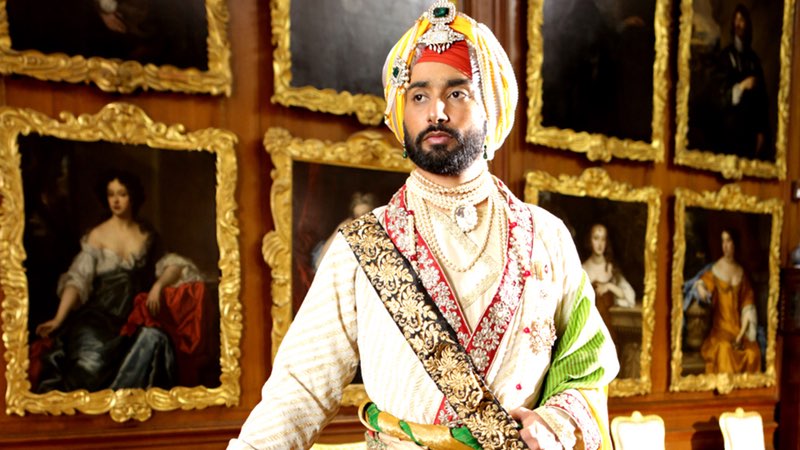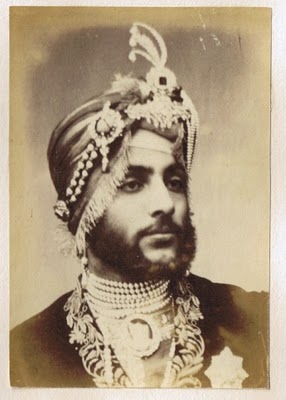 Kavi Raz’ historic drama The Black Prince brings to life the incredible story of a five year old Maharaja of Punjab, Duleep Singh, the last king of the Sikh Kingdom, who ascended to the throne at age five. At age ten, during the British / Sikh war, he was kidnapped, and in 1849 was sent to live in Queen Victoria’s court and forced to convert to Christianity. He was badly torn between these two halves of himself and longed to see his mother who was imprisoned in Lahore. At age 19, the Queen finally allowed Duleep to visit his mother; he brought her back to England and she advised him strongly to return to the Punjab and reclaim his birthright as King, and commit treason against Queen Victoria. Satinder Sartaaj, an internationally known Sufi singer and poet plays Duleep, a major undertaking for a first time actor. We spoke with him in Toronto, where he charmingly referred to the gathering clouds, drizzle and impending storm as “romantic weather”
Kavi Raz’ historic drama The Black Prince brings to life the incredible story of a five year old Maharaja of Punjab, Duleep Singh, the last king of the Sikh Kingdom, who ascended to the throne at age five. At age ten, during the British / Sikh war, he was kidnapped, and in 1849 was sent to live in Queen Victoria’s court and forced to convert to Christianity. He was badly torn between these two halves of himself and longed to see his mother who was imprisoned in Lahore. At age 19, the Queen finally allowed Duleep to visit his mother; he brought her back to England and she advised him strongly to return to the Punjab and reclaim his birthright as King, and commit treason against Queen Victoria. Satinder Sartaaj, an internationally known Sufi singer and poet plays Duleep, a major undertaking for a first time actor. We spoke with him in Toronto, where he charmingly referred to the gathering clouds, drizzle and impending storm as “romantic weather”
[youtube url=”https://www.youtube.com/watch?v=p2wflHSDY7I” width=”500″ height=”300″]
The Black Prince is your first acting credit and you carry it for two hours. Did you have anxiety about that – and how did you fall into the rhythm of the work?
I’m in 95 percent of the film, but this is like any kind of performance for me as a singer. That’s me, but I delved into his life entirely. It was tough for me as an actor. And for someone from the Punjab, I did a lot of effort for that English accent, definitely actual study to make it believable.

Playing a man from age 14 –55 elderly seems like an enormous challenge.
That was a different kind of scenario, something I’ve never done. In the morning, I’m forty and in the evening, I’m fourteen. I’m doing a North American tour and there are people from the Punjab where I live in California. It’s quite a community of wealthy and educated types in Los Angeles, they’re in the theatre and they need our histories. My community came onboard when they looked at the names attached to the film and I think what helped me get the part was my resemblance to the Maharajah Duleep Singh.
It was a big responsibility representing my culture. People consider me as an ambassador of the country and community, a huge responsibility on my shoulders. They searched for four years for the actor to play Duleep. And I put in a huge amount of effort. It was five years of my life including acting school, English was my third language and I had to maintain that British accent. The Hollywood scenario has no part in it! But the audiences like the film.
Incredible story of lost glory and that’s what I really like about the film – it reminds us that failure is human.
It’s an important lesson in Sikhism. The Indian response to when he was trying to regain his kingdom and community and culture, and in the early years he was tearful, shy and in the shadow of Queen Victoria. It was an unusual legacy but when he met his mother when he was 18 or 19 in Calcutta, he brought her to England. She started teaching him who he was; he was the son of his father, the Lion of Punjab who led a revolt against British imperialism. She said don’t forget.
[youtube url=”https://www.youtube.com/watch?v=569iuSDDvbs” width=”500″ height=”300″]
There’s an educational aspect to the film about British imperialism and the lingering effects it had and about this interesting man.
I find that people in America and Canada are curious about the brown guy at Buckingham palace, the man Queen Victoria called the Black Prince.
[youtube url=”https://www.youtube.com/watch?v=AiMJVnAV2Ys” width=”500″ height=”300″]
You’re a renowned singer and poet in the Sufi tradition and now you act. Tell me about the your work.
The Sufi tradition is way of living; it is part of Islam but it has many good things in common with all religions. There is dancing, singing, poetry about love and life and thinking about others. I learned the Sufi language and now I can write and sing. And now I’m here in Canada as an actor!
by @annebrodie
BFCA BTJA AWFJ TFCA FIPRESCI